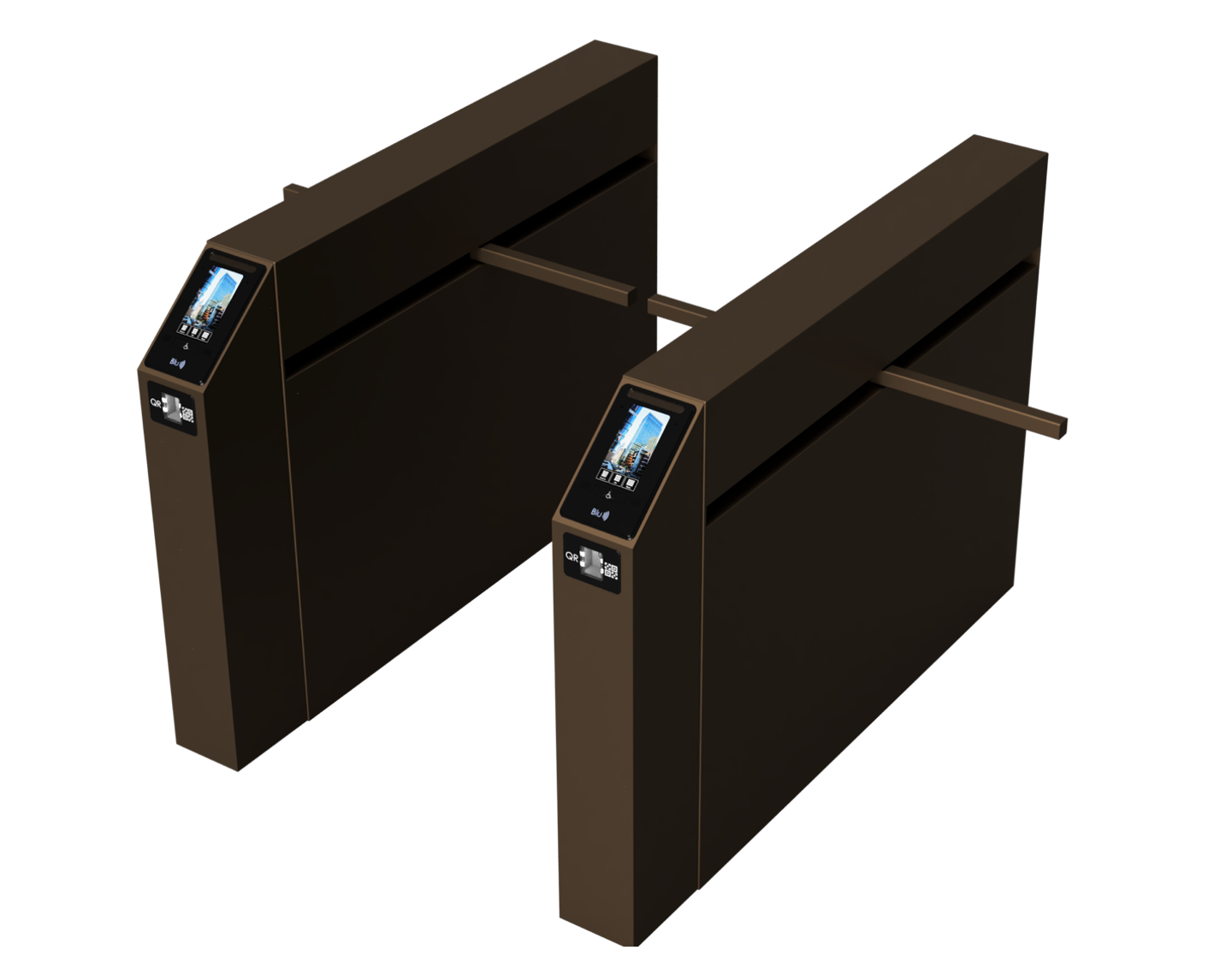Person Reader Turnstile Integration Models
BluBØX’s Person Reader is a sophisticated, multi-functional credentialing solution designed to meet the diverse needs of modern security systems. Whether through appearance recognition, QR code reading, or mobile credentials, the person reader provides seamless and secure access management.
To accommodate varying aesthetic and ergonomic requirements, BluBØX offers three distinct integration models for person readers within turnstiles:
- Bracket Vertical Mount: A forward-facing, vertical alignment with a bracket-mounted design.
- Angle Extrusion Mount: A sleek and integrated angled extension that embeds the person reader.
- Horizontal Low Profile Mount: A low-profile design that integrates the reader into the turnstile’s top surface.
Each model has unique strengths and trade-offs. This article explores the pros and cons of each mount in detail, covering factors like performance, aesthetics, ergonomics, and cost, to help you choose the right solution for your environment.
1. Bracket Vertical Mount

Overview
The Bracket Vertical Mount positions the person reader at the edge of the turnstile, oriented vertically and slightly cantered toward the center of the lane. This mount provides the most natural viewing geometry and keeps users outside the turnstile lane, minimizing operational issues.
Pros
- Recognition Performance: Best among the three models due to optimal camera positioning and minimal lighting interference.
- User Intuition: Users interact with a single unit for appearance recognition, credential presentation, and screen viewing, ensuring a seamless experience.
- Ergonomics: Natural alignment with user posture reduces the need for adjustments and ensures smooth operation for all heights.
- Lane Management: Keeps users outside the lane, avoiding pre-breach situations.
- Cost: Moderate cost, eliminating the need for complex extensions or custom metalwork.
- Throughput: High throughput due to quick, intuitive interaction.
- Simplified Layout: No additional card readers or QR code readers cluttering the design, contributing to usability.
Cons
- Aesthetics: Visible bracket and protruding mount may not appeal to architects favoring sleek designs.
- Visual Bulk: External hardware creates a less integrated appearance.
2. Angle Extrusion Mount

Overview
The Angle Extrusion Mount integrates the person reader seamlessly into a custom-angled extension, providing a polished and premium appearance. While it prioritizes aesthetics, it requires more deliberate user alignment.
Pros
- Aesthetics: Best visual integration with no visible brackets or external hardware.
- User Intuition: Maintains a unified design where all interactions happen in one unit.
- Lane Management: Keeps users outside the lane, minimizing pre-breach risks.
- Consistent Look: Provides a uniform, high-end design across all turnstile lanes.
Cons
- Recognition Performance: Lighting glare and lack of central alignment make it less forgiving than the Bracket Vertical Mount.
- Ergonomics: Requires deliberate alignment and approach, reducing flexibility.
- Throughput: Slightly slower throughput as users must adjust their position before interacting with the reader.
- Cost: Most expensive model due to custom metal fabrication and labor.
- QR Code Placement: Lower QR code reader placement may be less ergonomic for taller users.
3. Horizontal Low Profile Mount

Overview
The Horizontal Low Profile Mount fully integrates the person reader into the turnstile’s top surface, offering a clean, modern design. The camera, screen, and QR code reader are separated into distinct components.
Pros
- Aesthetics: Best low-profile design, flush with the turnstile surface for a sleek and modern look.
- Cost: Most cost-effective solution, requiring minimal customization or additional hardware.
- Throughput: High throughput due to simplified and compact design.
- Improved QR Code Access: QR code reader is well-positioned for ergonomic access.
Cons
- Recognition Performance: Separation of the camera, screen, and QR code reader into distinct components makes interaction less intuitive.
- Ergonomics: Users may need to bend slightly to interact with the screen, reducing comfort.
- Lane Management: Higher risk of lane intrusion due to closer placement of the reader to the turnstile lane.
- Lighting Challenges: More susceptible to glare from overhead lighting, affecting screen visibility and recognition accuracy.
- User Intuition: Less intuitive compared to other models as users must shift between separate components for different interactions.
Comparison Summary Table
|
Aspect |
Bracket Vertical Mount |
Angle Extrusion Mount |
Horizontal Low Profile Mount |
|
Recognition Performance |
Best |
Good |
Very Good |
|
Ergonomics |
Best |
Good |
Good |
|
Aesthetics |
Moderate |
Very Good |
Best |
|
User Intuition |
Best |
Very Good |
Good |
|
Lane Management |
Best |
Best |
Moderate (higher risk) |
|
Throughput |
High |
Good |
Very Good |
|
Cost |
Moderate |
Expensive |
Best (most cost-effective) |
Conclusion
Choosing the right turnstile integration model depends on your priorities:
- If recognition performance and usability are critical, the Bracket Vertical Mount is the best choice.
- If aesthetic integration is a priority, the Angle Extrusion Mount offers a premium, seamless appearance.
- If cost efficiency and low-profile design are paramount, the Horizontal Low Profile Mount is ideal.
All three models share BluB0X’s advanced features, including upgraded cameras, enhanced electronics, and improved iconography, ensuring a high level of performance and user satisfaction.
Additional Images
Bracket Vertical Mount:

Angle Extrusion Mount:

Low Profile Mount:
